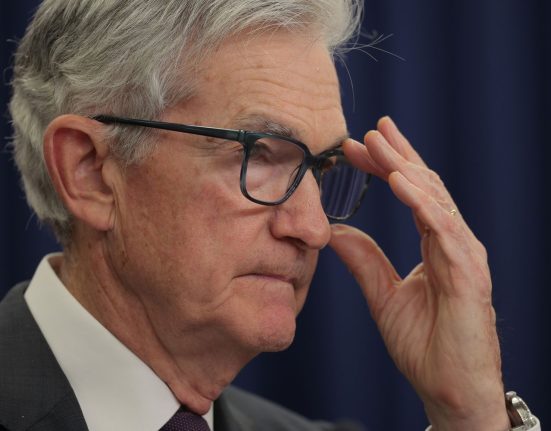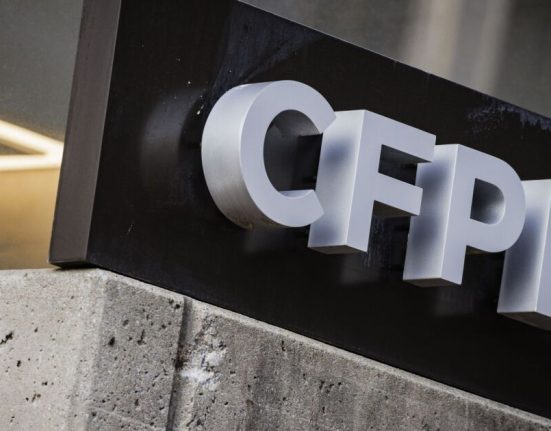The Consumer Financial Protection Bureau plans to ask a federal judge in Kentucky to vacate a Biden-era rule allowing customers to freely share their bank and credit card account details with financial technology companies, multiple sources told Bloomberg Law.
Mark Calabria, an Office of Management and Budget official detailed to the CFPB to lead rulemaking efforts, has in recent days informed companies and trade groups that the agency will attempt to use a legal maneuver to scrap the open banking rule without going through the formal process required by the Administrative Procedure Act, according to industry sources who requested anonymity to discuss regulatory conversations.
The CFPB last month was able to get its $8 credit card late fee cap vacated in litigation challenging that rule, also a Biden administration effort, and hopes to use the same tool on the open banking measure, the sources said.
The agency then plans to rewrite the open banking rule to allow banks to charge customers for data access and to limit banks’ liability for data breaches, the sources said.
The CFPB may also look to expand the scope of the rule beyond deposit and credit card accounts, the sources said.
But the agency will likely face a steep challenge vacating the open banking rule, in part because a leading fintech trade group has moved to defend it.
In the end, the CFPB may try to cut procedural corners even though banks and other industry participants argued the agency skirted the APA when it wrote the open banking rule. Federal agencies are required to go through the notice-and-comment rulemaking process to rescind an existing regulation.
“It seems like an effort to sidestep the notice-and-comment process under the APA that they would otherwise be required to follow,” said Adam Maarec, a member of McGlinchey Stafford LLP whose practice focuses on fintech.
The CFPB had previously discussed reopening the rule, either through the notice-and-comment rulemaking process or by using litigation filed by the Bank Policy Institute and others to allow for amendments to the regulation, sources told Bloomberg Law.
“The CFPB’s Section 1033 rule fails on two fronts: it violates the law and jeopardizes the security and privacy of consumer financial data,” Paige Pidano Paridon, BPI’s executive vice President and co-head of regulatory affairs, said in a statement to Bloomberg Law. “American consumers rightfully expect a competitive and safe data-sharing ecosystem where all participants—including fintechs—are held to the same high standards and BPI is fighting to preserve that framework.”
The CFPB didn’t immediately respond to a request for comment.
Stiff Opposition
Congress required the CFPB to develop the open banking rule in Section 1033 of the 2010 Dodd-Frank Act.
The rule, finalized by former CFPB Director Rohit Chopra in October, allows customers to easily share their bank and credit card account information with financial technology companies such as
The industry plaintiffs leveled several claims that the CFPB violated the APA, including by exceeding its statutory authority and approving an arbitrary and capricious final rule.
Now, the CFPB intends to ask Judge Danny C. Reeves of the US District Court for the Eastern District of Kentucky to vacate the rule entirely.
A federal judge in Texas eliminated the CFPB’s credit card late fee ban in April after the CFPB and industry plaintiffs reached an agreement to eliminate it.
But the CFPB and BPI may face stiff opposition from another industry player if they try to use the same approach on the open banking rule.
The Financial Technology Association, a fintech trade group, has moved to intervene and defend the rule. Reeves on May 5 said he will rule on the FTA’s request before an existing stay in the litigation expires.
“This rule puts in place important consumer protections and raises the bar on safety for the entire ecosystem,” said Penny Lee, the FTA’s president and CEO. “Vacating it is a handout to the biggest banks and a missed opportunity to further financial innovation in the US.”
Should the FTA win the right to intervene, it’ll be able to argue that the CFPB followed administrative procedures in crafting the rule and is now looking to go around those requirements in a bid to rewrite it, said Christopher Odinet, a law professor at Texas A&M University who specializes in banking and consumer finance law.
“You’re actually going to have powerful, resourced litigants making those arguments,” he said.
Jenner & Block LLP is representing the Financial Technology Association in the case.
Other Roadblocks
Another factor that may come into play is the significant staff cuts at the CFPB.
Acting CFPB Director Russell Vought last month attempted to fire approximately 1,500 of the CFPB’s 1,700-member workforce, including its rule-writing staff.
The reduction-in-force order is currently on hold amid litigation filed by the National Treasury Employees Union, which represents many CFPB employees, and other plaintiffs. But it’s unclear how many agency employees are back doing their jobs.
The inability to write a new rule may come up in the proceedings, Odinet said.
The US Supreme Court’s decision last June in Loper Bright Enterprises v. Raimondo, which eliminated a decades-old doctrine that deferred to regulators to interpret unclear laws, may also prove a roadblock for the CFPB, he said.
“Deference to the enactment of rules has been diminished,” Odinet said. “Deference to the repeal of rules will also have been diminished.”
The CFPB last month separately asked a court to vacate a Biden-era rule barring medical debt from appearing on consumer credit reports as part of an agreement with the Consumer Data Industry Association in its litigation challenging the measure. A Texas federal judge in that case is weighing a motion to intervene from consumer groups seeking to defend the rule.







